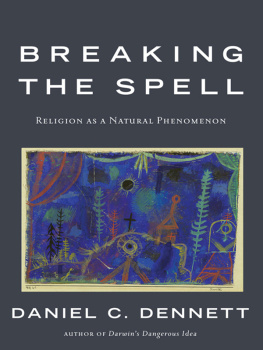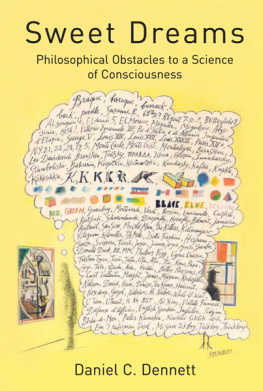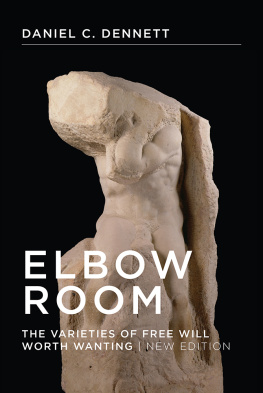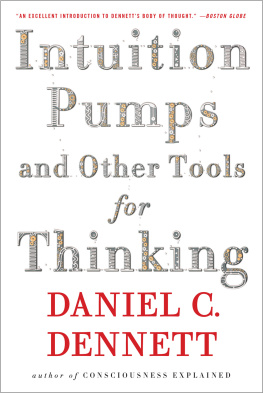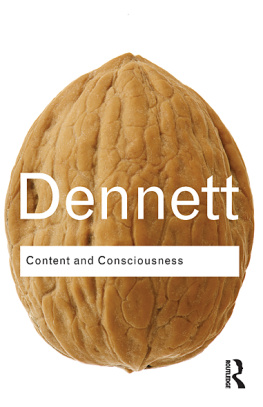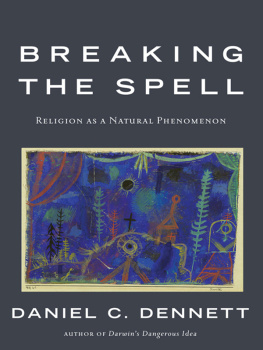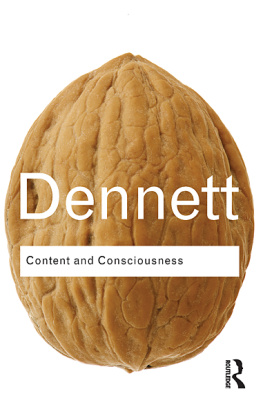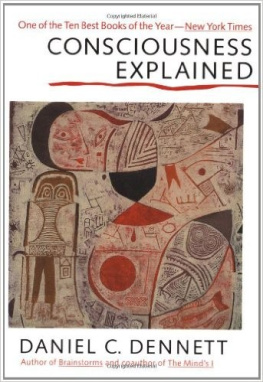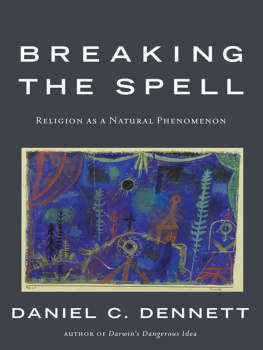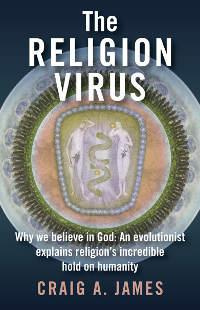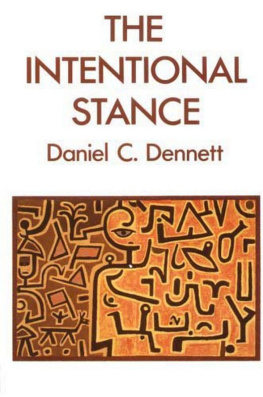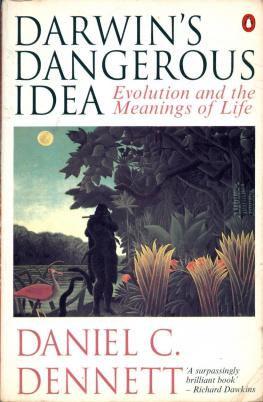ALSO BY DANIEL C. DENNETT
Content and Consciousness
Brainstorms
The Minds I
(with Douglas Hofstadter)
Elbow Room
The Intentional Stance
Consciousness Explained
Darwins Dangerous Idea
Kinds of Minds
Brainchildren
Freedom Evolves
Sweet Dreams

VIKING
Published by the Penguin Group
Penguin Group (USA) Inc., 375 Hudson Street, New York, New York 10014, U.S.A. Penguin Group (Canada), 90 Eglinton Avenue East, Suite 700, Toronto, Ontario, Canada M4P 2Y3 (a division of Pearson Penguin Canada Inc.) Penguin Books Ltd, 80 Strand, London WC2R 0RL, England Penguin Ireland, 25 St. Stephens Green, Dublin 2, Ireland (a division of Penguin Books Ltd) Penguin Group (Australia), 250 Camberwell Road, Camberwell, Victoria 3124, Australia (a division of Pearson Australia Group Pty Ltd) Penguin Books India Pvt Ltd, 11 Community Centre, Panchsheel Park, New Delhi110 017, India Penguin Books (NZ), Cnr Airborne and Rosedale Roads, Albany, Auckland 1310, New Zealand (a division of Pearson New Zealand Ltd) Penguin Books (South Africa) (Pty) Ltd, 24 Sturdee Avenue, Rosebank, Johannesburg 2196, South Africa
Penguin Books Ltd, Registered Offices: 80 Strand, London WC2R 0RL, England
First published in 2006 by Viking Penguin, a member of Penguin Group (USA) Inc.
Copyright Daniel C. Dennett, 2006
All rights reserved
LIBRARY OF CONGRESS CATALOGING-IN-PUBLICATION DATA
Dennett, Daniel Clement.
Breaking the spell: religion as a natural phenomenon / Daniel C. Dennett.
p.cm.
Includes bibliographical references and index.
ISBN: 978-1-1012-1886-0
ReligionControversial literature. I. Title.
BL2775.3.D46 2006
200dc22 2005042415
Without limiting the rights under copyright reserved above, no part of this publication may be reproduced, stored in or introduced into a retrieval system, or transmitted, in any form or by any means (electronic, mechanical, photocopying, recording, or otherwise), without the prior written permission of both the copyright owner and the above publisher of this book.
The scanning, uploading, and distribution of this book via the Internet or via any other means without the permission of the publisher is illegal and punishable by law. Please purchase only authorized electronic editions and do not participate in or encourage electronic piracy of copyrighted materials. Your support of the authors rights is appreciated.
FOR SUSAN
Contents
Preface
Let me begin with an obvious fact: I am an American author, and this book is addressed in the first place to American readers. I shared drafts of this book with many readers, and most of my non-American readers found this fact not just obvious but distractingeven objectionable in some cases. Couldnt I make the book less provincial in outlook? Shouldnt I strive, as a philosopher, for the most universal target audience I could muster? No. Not in this case, and my non-American readers should consider what they can learn about the situation in America from what they find in this book. More compelling to me than the reaction of my non-American readers was the fact that so few of my American readers had any inkling of this biasor, if they did, they didnt object. That is a pattern to ponder. It is commonly observedboth in America and abroadthat America is strikingly different from other First World nations in its attitudes to religion, and this book is, among other things, a sounding device intended to measure the depths of those differences. I decided I had to express the emphases found here if I was to have any hope of reaching my intended audience: the curious and conscientious citizens of my native landas many as possible, not just the academics. (I saw no point in preaching to the choir.) This is an experiment, a departure from my aims in earlier books, and those who are disoriented or disappointed by the departure now know that I had my reasons, good or bad. Of course I may have missed my target. We shall see.
My focus on America is deliberate; when it comes to contemporary religion, on the other hand, my focus on Christianity first, and Islam and Judaism next, is unintended but unavoidable: I simply do not know enough about other religions to write with any confidence xiii about them. Perhaps I should have devoted several more years to study before writing this book, but since the urgency of the message was borne in on me again and again by current events, I had to settle for the perspectives I had managed to achieve so far.
One of the departures from my previous stylistic practices is that for once I am using endnotes, not footnotes. Usually I deplore this practice, since it obliges the scholarly reader to keep an extra bookmark running while flipping back and forth, but in this instance I decided that a reader-friendly flow for a wider audience was more important than the convenience of scholars. This then let me pack rather more material than usual into rather lengthy endnotes, so the inconvenience has some recompense for those who are up for the extra arguments. In the same spirit, I have pulled four chunks of material meant mainly for academic readers out of the main text and deposited them at the end as appendixes. They are referred to at the point in the text where otherwise they would be chapters or chapter sections.
Once again, thanks to Tufts University, I have been able to play Tom Sawyer and the whitewashed fence with a remarkably brave and conscientious group of students, mostly undergraduates, who put their own often deeply held religious convictions on the line, reading an early draft in a seminar in the fall of 2004, correcting many errors, and guiding me into their religious worlds with good humor and tolerance for my gaffes and other offenses. If I do manage to find my target audience, their feedback deserves much of the credit. Thank you, Priscilla Alvarez, Jacquelyn Ardam, Mauricio Artinano, Gajanthan Balakaneshan, Alexandra Barker, Lawrence Bluestone, Sara Brauner, Benjamin Brooks, Sean Chisholm, Erika Clampitt, Sarah Dalglish, Kathleen Daniel, Noah Dock, Hannah Ehrlich, Jed Forman, Aaron Goldberg, Gena Gorlin, Joseph Gulezian, Christopher Healey, Eitan Hersh, Joe Keating, Matthew Kibbee, Tucker Lentz, Chris Lintz, Stephen Martin, Juliana McCanney, Akiko Noro, David Polk, Sameer Puri, Marc Raifman, Lucas Recchione, Edward Rossel, Zack Rubin, Ariel Rudolph, Mami Sakamaki, Bryan Salvatore, Kyle Thompson-Westra, and Graedon Zorzi.
Thanks also to my happy team in the Center for Cognitive Studies, the teaching assistants, research assistants, research associate, and program assistant. They commented on student essays, advised students who were upset by the project, advised me; helped me devise, refine, copy, and translate questionnaires; entered and analyzed data; retrieved hundreds of books and articles from libraries and Web sites; helped one another, and helped keep me on track: Avery Archer, Felipe de Brigard, Adam Degen Brown, Richard Griffin, and Teresa Salvato. Thanks as well to Chris Westbury, Diana Raffman, John Roberts, John Symons, and Bill Ramsey for their participation at their universities in our questionnaire project, which is still under way, and to John Kihlstrom, Karel de Pauw, and Marcel Kinsbourne for steering me to valuable reading.
Special thanks to Meera Nanda, whose own brave campaign to bring scientific understanding of religion to her native India was one of the inspirations for this book, and also for its title. See her book Breaking the Spell of Dharma (2002) as well as the more recent Prophets Facing Backwards (2003).

